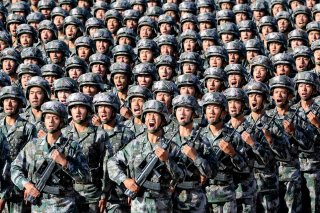Michael Peck

"The PLA [People's Liberation Army] is focused not merely on competing with the United States or other nations as a goal in and of itself, but instead on competing as a means to achieving the policy outcomes identified by the CCP [Communist Party of China] -- deterring U.S. intervention and defeating the U.S. military if the United States and China do come into open conflict," writes RAND Corp. researcher Scott Harold in a new study.
The study paints a picture of a nation with a focus on goals and what it needs to achieve them. During the Cold War, the Soviet Union bankrupted itself with an obsessive need to match U.S. capabilities such as ballistic missile defense. China won't make that same mistake. "The PLA appears not to compete in certain areas because it does not need certain capabilities to accomplish its directed mission, or it has other means to address the military problem at hand," Harold writes.
The RAND study focused on the impressive growth in Chinese air and missile power over the last decade, an achievement fueled partly by relentless copying -- or stealing -- foreign technology, whether Russian carrier-based jets or the American F-35. Staggered by the success of U.S. smart weapons in Desert Storm, China has also switched from a Maoist mass army to a high-tech force that much more resembles current Western practice.
But even here, imitation is selective. "The PLA does not blindly copy the USAF (or the U.S. military or other foreign militaries more generally) but instead studies foreign military experiences to learn what works and what does not, what can be adopted and adapted to serve China’s goals, and what should be ignored or discarded as irrelevant to the missions set before the PLA by the CCP," Harold writes. "When the PLA finds problems that it cannot solve through copying, it has proven sufficiently resourceful to develop innovative solutions to its operational challenges, creating entirely new capabilities or operating in new and creative ways to frustrate the ability of the United States and other advanced militaries to operate in proximity to Chinese shores."
Thus, China has only recently enhanced its aerial refueling and air transport capabilities, or has flown long-range bomber over the Pacific. Until a few years ago, Beijing wasn't trying to project its power, but when it did, it started acquiring the capabilities it needed.
Several nations, including Iran and North Korea, like to boast that they can defeat the U.S. in a war. But whether they actually mean that, or how they define victory, is another matter. So, does China believe it can militarily best the U.S.?
“Chinese analysts often project an image of strength and confidence oriented at foreign audiences that is not always reflective of their genuine assessments of their own remaining weaknesses,” Harold told the National Interest. “Such an approach enables them to capture some deterrent or compellence advantages before such are really due to them if they can create an outsized image of their capabilities in the minds of adversaries.”
“I’ve not seen anything that indicates that the PLA believes it has definitive air/space or overall military dominance over the US military today,” Harold added. “I think it is what they seek and are planning to try to achieve.”
No comments:
Post a Comment